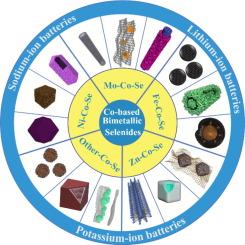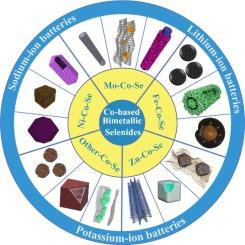Recent advances of cobalt-based bimetallic selenides anodes for high-performance rechargeable alkali metal–ion batteries
IF 13.2
1区 工程技术
Q1 ENGINEERING, CHEMICAL
引用次数: 0
Abstract
Cobalt-based bimetallic selenides (CMSes), which combine the high specific capacity of cobalt selenide with the advantages of other metal selenides and feature abundant heterointerfaces for rapid reaction kinetics, have been considered as highly promising anode materials for alkali metal–ion batteries (AIBs). This review explores the advancements of various CMSes in their application to AIBs. Specifically, we summarize the synthesis methods and energy storage mechanism of CMSes for AIBs. Furthermore, a systematic overview is provided on the enhancement of electrochemical performance of various CMSes following modifications, including heterostructure engineering, micro-nanostructure control, vacancies constructing and introduction of carbon materials. Additionally, the exploration of ion storage mechanism of CMSes through various characterization methods, such as ex-situ or in-situ measurements, and theoretical calculations is also be discussed. Finally, the key directions for the future development of CMSes in the field of AIBs are highlighted.


用于高性能可充电碱金属离子电池的钴基双金属硒化物阳极的最新进展
钴基双金属硒化物(CMSes)结合了硒化钴的高比容量和其他金属硒化物的优点,并具有丰富的异质界面以实现快速反应动力学,一直被认为是非常有前途的碱金属离子电池(AIBs)阳极材料。本综述探讨了各种 CMS 在应用于 AIB 方面的进展。具体而言,我们总结了用于 AIB 的 CMS 的合成方法和储能机制。此外,还系统概述了各种 CMS 经改性后电化学性能的提高,包括异质结构工程、微纳米结构控制、空位构建和碳材料的引入。此外,还讨论了通过各种表征方法(如原位或原位测量以及理论计算)探索 CMSes 的离子存储机制。最后,重点介绍了 CMSes 在 AIB 领域的未来发展方向。
本文章由计算机程序翻译,如有差异,请以英文原文为准。
求助全文
约1分钟内获得全文
求助全文
来源期刊

Chemical Engineering Journal
工程技术-工程:化工
CiteScore
21.70
自引率
9.30%
发文量
6781
审稿时长
2.4 months
期刊介绍:
The Chemical Engineering Journal is an international research journal that invites contributions of original and novel fundamental research. It aims to provide an international platform for presenting original fundamental research, interpretative reviews, and discussions on new developments in chemical engineering. The journal welcomes papers that describe novel theory and its practical application, as well as those that demonstrate the transfer of techniques from other disciplines. It also welcomes reports on carefully conducted experimental work that is soundly interpreted. The main focus of the journal is on original and rigorous research results that have broad significance. The Catalysis section within the Chemical Engineering Journal focuses specifically on Experimental and Theoretical studies in the fields of heterogeneous catalysis, molecular catalysis, and biocatalysis. These studies have industrial impact on various sectors such as chemicals, energy, materials, foods, healthcare, and environmental protection.
 求助内容:
求助内容: 应助结果提醒方式:
应助结果提醒方式:


